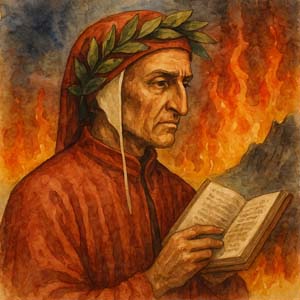the greater the intensity of their love,
and, mirror-like, each soul reflects the other.”
— Dante Alighieri
 Poet Dante Alighieri (1265–1321), born in Florence, Italy, gave the world a timeless gift: The Divine Comedy, a sacred journey of the soul from darkness to light.
Poet Dante Alighieri (1265–1321), born in Florence, Italy, gave the world a timeless gift: The Divine Comedy, a sacred journey of the soul from darkness to light.
In exquisite verse, Dante imagined the afterlife—not to terrify, but to awaken. Through Inferno, Purgatorio, and Paradiso, he offered a map of human struggle and spiritual redemption.
He wrote: “The more souls who resonate together, the greater the intensity of their love.” That’s the gift of true connection: one soul reflecting another in divine harmony.
Guided by the Roman poet Virgil and later by his beloved Beatrice, Dante’s pilgrimage was both deeply personal and universally profound. His language shaped a nation. His vision still stirs hearts.
Henry Wadsworth Longfellow, grieving his wife’s death, found solace by translating Dante’s words. He called the work a “medieval miracle of song.”
Dante reminds us: even in grief, there is grace. Even in pain, beauty endures. Even in exile, the soul finds its way home.
 Love is the music that joins our souls to eternity.💥
Love is the music that joins our souls to eternity.💥
